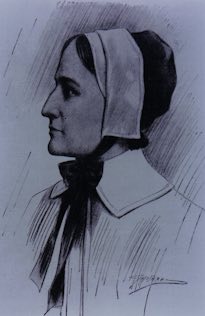“She was a woman of haughty and fierce carriage, a nimble wit and active spirit, a very voluble tongue, bolder than a man,” said Governor John Winthrop of religious pioneer Anne Hutchinson, whom he expelled from the Massachusetts Bay Colony in 1638 for her insistence on practicing religion as she chose, and on preaching herself.
An émigré from England who settled in the North American continent in 1634, Anne Hutchinson came under fire from the colony elders
when she began expounding her theology at meetings in her home. She believed in a “covenant of grace,” in which faith alone was enough to achieve salvation. Others disagreed, and when Winthrop became governor, Hutchinson was banished and excommunicated. She moved with her family to the area of the country that became Rhode Island, and after her husband’s death, she moved to Long Island, where in 1643 she and five of her six children were killed in an attack. This advocate of freedom of religion, the right to free assembly and women’s rights was
honored in the naming of the Hutchinson River and the Hutchinson River Parkway.

